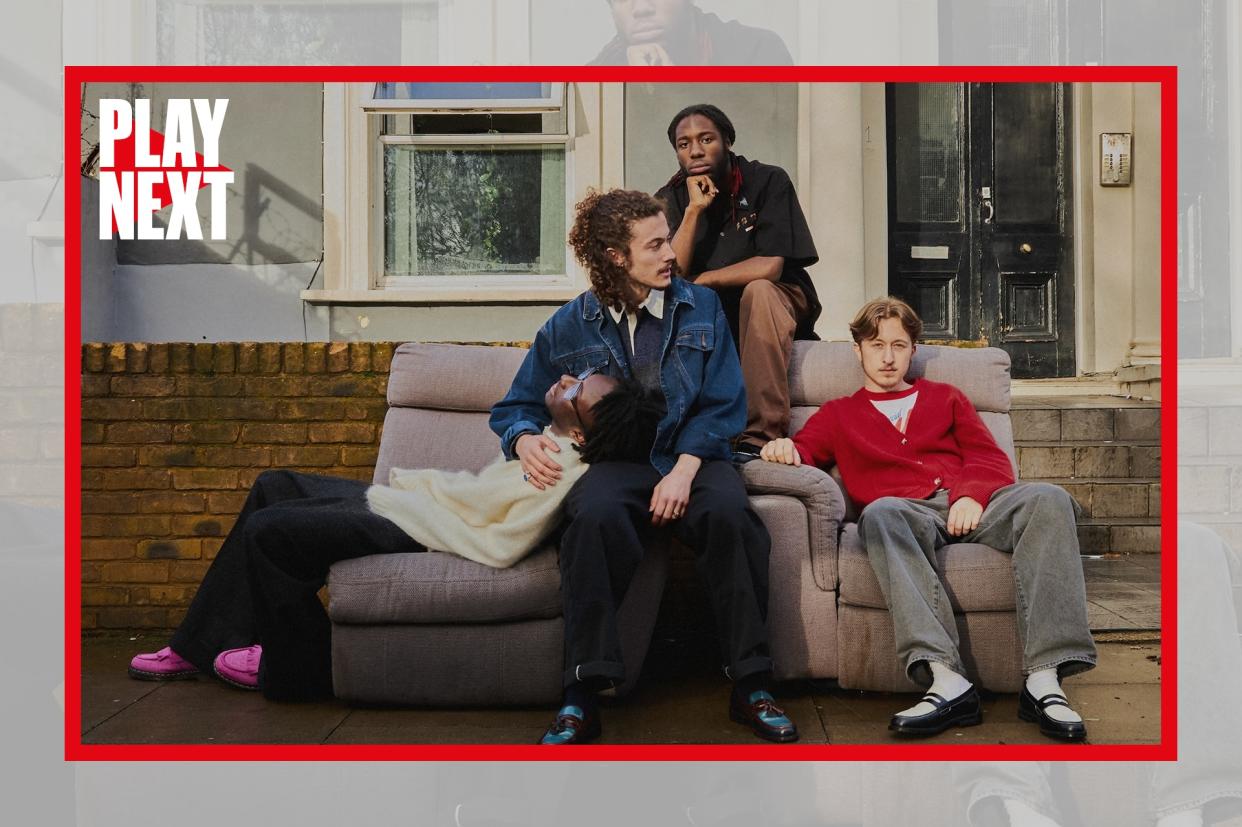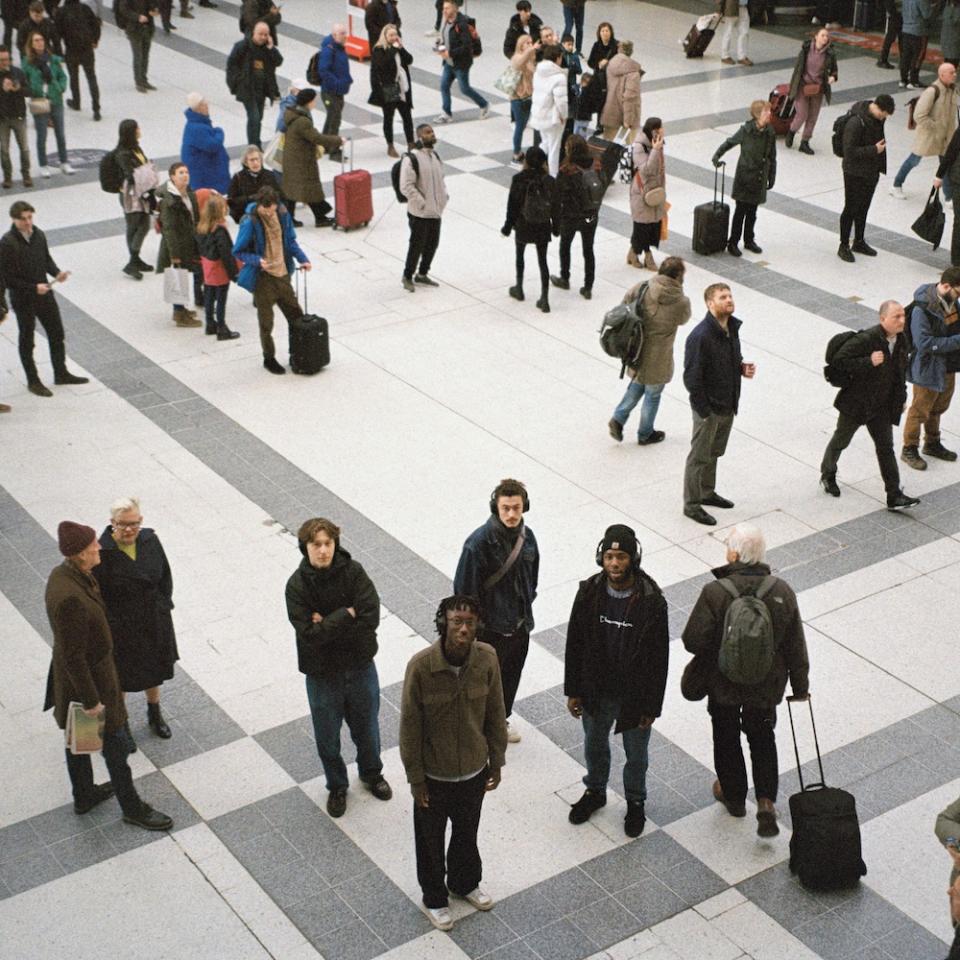Meet oreglo, the London collective that are far more than just a jazz band

When Ezra Collective won the 2023 Mercury Prize, drummer and bandleader Femi Koleoso spent a great deal of his acceptance speech shining a light on the importance of London’s musical youth clubs. “This is a special moment for every single organisation across the country ploughing their efforts and time into young people playing music,” Koleoso said, naming the likes of Tomorrow’s Warriors and Kinetica Bloco.
Both organisations – among others – were pivotal in the formation and education of oreglo, a four-piece jazz-adjacent collective rewriting the rules of the genre with debut EP Not Real People, out next week via Gilles Peterson’s Brownswood Recordings.
The band – c-sé (keys), Linus Barry (guitar), Nicco Rocco (drums) and Teigan Hastings (tuba) – all met through various configurations of these clubs, and credit them with cultivating their open-minded and fluid attitude towards music making. With differing musical backgrounds from psych rock to electronic and classic jazz, the quartet make music that’s indefinable in the best way.
In our Play Next interview, we discuss the band’s disparate musical tastes, how that informs their striking debut EP, and the limitless future of oreglo.
Can you tell us about how influential youth clubs were to your formation and development as an act?
Teigan: It definitely influenced my ability to be able to work with people. Being in Kinetica Bloco, I was playing with 149 other people. It teaches you that you can play your part, but to play your part well you have to be listening to everyone else as well.
Nicco: Warriors helped me learn my craft, but also gave me that space to meet other musicians and see other people who were doing it. People in the generation above me there were Sultan Stevenson and Cassius Cobbson, and then in the generation above them were Nubya Garcia, Moses Boyd, Femi Koleoso. You can see the growth and it gives you people to look up to.
Working out how you can do this and be successful is hard if you don’t know where to look. I’d think, ‘Ok by next summer I want to sound like Cassius, and then by summer after I want to sound like this other guy’. Eventually, it will help you sound like you.
c-sé: I went to Julian Joseph Jazz Academy, and it instilled a discipline in me. Low key, it felt like musical military! That mentality carried on with me. No matter what I do, I have to keep the integrity of the music at all costs, and respect the music I’m playing like it’s another person in the room.
What different musical backgrounds were you bringing to the table for this project?
Linus: I was interested in rock stuff and electronic music as well. I grew up on my mum’s love for French dance music, and then formed a love for psychedelic rock like Cream and The Small Faces, but more modern stuff like Tame Impala and Melody’s Echo Chamber. That woozy psychedelic sound is what my ear is really attracted to.
Nicco: One of my first musical inspirations was David Bowie, and my dad listened to a lot of Italian fusion stuff. I liked a lot of the rock stuff and me and Linus used to have a rock band together.
c-sé: I gravitate to a lot of electronic, rap and jazz music. The Miles Davis era of jazz and then Moodyman and Aphex Twin. Björk is one of my biggest inspirations too. All these people keep you on your toes with their music, and that’s so important.
Teigan: I would start listening to Lovers’ Rock stuff, and then when I got into Tuba in Year 6, I got into Brazilian samba and Afrobeat, Fela [Kuti] stuff and some more grime-y stuff. I was exposed to a lot at the same time and it created this thing in my head that makes me enjoy heavy bass.
And how do all those pieces come together to make a cohesive sound like you present on Not Real People?
Nicco: It was a learning experience with this being our first body of work. We were so used to playing live and had to work out how to translate that to the studio.
Linus: The nature of our music is very improvised and feeling-based, and we like being able to change things up. Before one gig, c-sé taught us the tune 10 minutes before we were going on stage.
c-sé: One of my mentors, Julian Joseph, told me that a studio recording should always be a documentation of where you are musically. When we’re recording, it’s the core of the song, or how we primarily imagine it, but we can alter it live depending on how we feel that day. Both as people and as musicians, we’ve grown so much, and this EP documents that journey for us.

How has oreglo progressed and evolved since your early days?
c-sé: I think we only started sounding good as a band a couple of months ago. This year, the fluidity that we play with has really come in. Last year we were very much in our boxes. Now we understand each other more and the chemistry is there. Coming from a jazz background, it’s about being much more open to stuff.
Teigan: We’re all so open to trying everything. No one could come to oreglo with an idea and get shut down. If it doesn’t work, put it on the shelf and take the pieces from it that work and try something from there.
Nicco: There’s no mentality of thinking I might get kicked out or not get heard. It’s very much an even playing field. Not even a playing field – it’s just a field!
You’ve spoken a lot about London’s influence on you as a band – how does that manifest itself in your music?
Linus: It’s about navigating all of the feelings that come with being a young person in London and working out different parts of our lives. Making it sound like London isn’t something that we try to do – it just comes out in the music. We’re not trying to embody London, we’re just part of it. Our change is London’s change.
There are some similarities between yourselves and the prominent modern UK jazz scene, but you also seem to sit apart as well – does that excite you?
c-sé: UK jazz is a big inspiration to us, but we never saw ourselves in that box. There’s a very, very strong that reggae roots and rock foundation in the band. When I first came to oreglo, my musical palette opened up and I feel like it’s happened to the whole band. The way we perceive our songs isn’t just being UK jazz. It’s this collective of sounds that we’ve heard in London.
Nicco: To me, music is very simple, and we are very diverse. As we’ve just expressed, you couldn’t pick a more random group of artists, but we’re united by the fact that we like stuff that sounds good. It sounds cheesy, but we all gravitate like towards stuff that we think is evocative and emotional to us. I think it’s easy because you don’t have to think about what you like – you just bring it to the table and see what happens.

 Yahoo News
Yahoo News 
